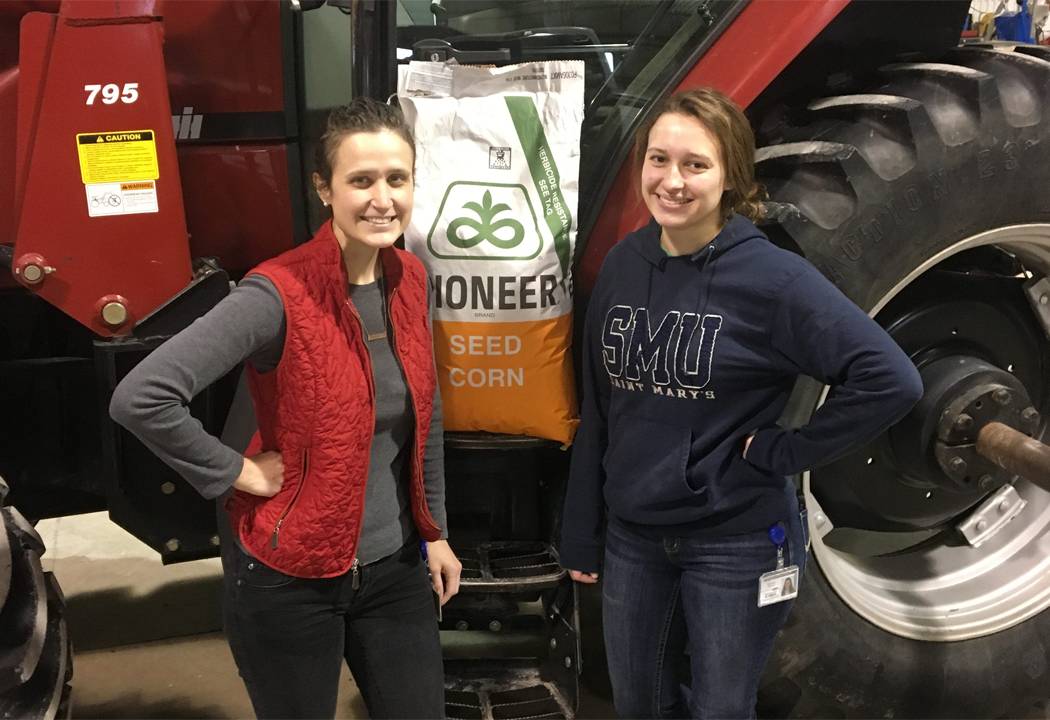Looking back, Dorothy Kirsch ’19 and JoAnn Harren ’11 may not have always appreciated their chores — growing up on their family hog farm in Wesley, Iowa.
But both sisters now appreciate the strong work ethic, the responsibility, and the agricultural life that ultimately has led them to careers in plant breeding.
Harren, who majored in biology at Saint Mary’s, now works as a senior research associate with DuPont Pioneer Research Station in Algona, Iowa; Kirsch, a junior biology major, is currently interning at the same facility.
Harren paved the way. In high school, she really enjoyed the sciences and got involved with the World Food Prize Youth Institute. She earned a Borlaug-Ruan International Internship through which, after high school, she worked at a grad school lab at China Agriculture University in Beijing.
While attending Saint Mary’s, she did internships through DuPont Pioneer for three summers. And after graduating, she continued her studies at the University of Minnesota and did an internship at the International Rice Research Institute in the Philippines.
“The professor/student interaction in the Science Department at Saint Mary’s helped me discern how I would like to further my education,” Harren said. “The support I received prepared me for graduate school.”
She returned to Pioneer about four years ago after getting married.
“As a senior research associate,” she said. “I do a lot of the molecular breeding work, looking at corn and soy plants creating whole genome predictions. So we don’t need to grow a plant to see if it’s going to grow or not.”
Harren thrives on the challenging environment at Pioneer and says it’s exciting to see her work utilized. “For my master’s thesis, I mapped and published quantitative trait loci (QTLs) for Soybean Death Syndrome in soybeans. These QTLs have never been utilized outside of my graduate thesis work. With Pioneer, I can see the research I do being put to use. That’s what drives me to enjoy my job.”
When her sister arrived at Saint Mary’s, she too knew she wanted to go into agriculture with a chemistry emphasis. Kirsch discovered she fit better in biology than chemistry, but is quick to point out she’s enjoyed all of her classes.
“I haven’t had a single professor I don’t like,” she said. “The professors are always there and willing to help. It’s a great college and I’ve had a great experience so far.”
Kirsch is currently completing an eight-month internship at DuPont Pioneer Research Station, where she enjoys meeting with and learning from breeders. She’ll also be completing her senior thesis, “Plant breeding techniques by the use of Per Se Traits in Maize (Zea Mays).”
Her objective is to compare the phenotypic traits between hybrids and their corresponding inbred parents to determine if the inbred traits are indicative of the hybrid phenotypes. “I’m going to look into the way that breeders develop hybrid lines based on the inbred data and determine if it’s a good way or if they should be doing it differently,” she said.
Her future goal is to earn an advanced degree in plant breeding. “When I talk to corn breeders, it’s exciting to hear the new developments and see the progress they’re making,” she said. “Years of material goes into one hybrid. The goal is to have a high-yielding hybrid that can withstand diseases and droughts and high wind, all the conditions it might encounter in a field.”
Kirsch said there’s no doubt her background has made an impact on what she’s decided to do with her future. “I appreciated living on a family farm. It helped me have a better work ethic.”
Harren agrees. “The work ethic is huge along with the respect for the land, as well as respect for people,” she said. “You need to have that strong work ethic to be able to thrive in this type of industry. I would not be where I am today if I did not grow up on that family farm.”
Harren said she’s proud to work with a company like DuPont Pioneer, which is working to help farmers in Africa and the Middle East increase agricultural productivity and food production through improved crop yields. Additionally, she said, the company has found a way to fortify sorghum grain, a mainstay in African diets, with nutrients to make it healthier.
“Pioneer is about feeding the world. It’s great to be part of a company like that,” she said.
Photo caption: Sisters JoAnn Harren ’11, left, and Dorothy Kirsch ’19
